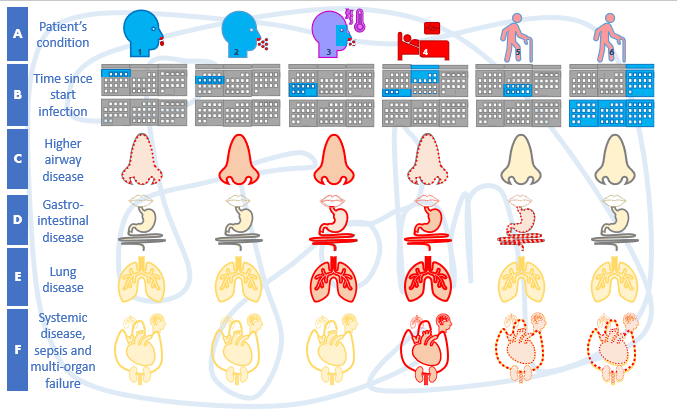COVID-19
Immunity against SARS-2 and COVID-19
- Do antibodies protect against the virus?
- Does immunity protect from infection?
- Does immunity protect from acute disease?
- Does immunity protect from long covid?
- How long does immunity last?
Do antibodies protect against the virus?
Unsure but in general they indicate that an immune response has been monitored.
- Immunity against viruses is mostly cellular immunity i.e., T-cells.
- Scientists have a lot of discussion on antibodies. Antibodies are associated with more severe disease, and people without antibodies might be protected from the virus.
- However, it is difficult to dissect antibody responses from B-cells from T-cells fighting virus infected cells. Most people will have both, so many studies indicate that antibodies could play a role in protection, but this still needs to be proven.
Does immunity protect from infection?
No, immunity is in the blood, but early infection is in the upper airways.
- In general airway infection do not cause sterilising immunity i.e., protection from infection. Immunity by T-cells and possibly antibodies from B-cells will circulate in the blood, lymph, and the internal tissues.
- Virus infection starts at the upper airways and there the virus is not stopped by T-cells or normal antibodies.
- In most but not all immune people the body could also make special antibodies, Immunoglobulin A (IgA), which can be secreted to the mucous membranes. This is temporary situation and will decrease rapidly after 2 months to zero after 4 months.
Does immunity protect from acute disease?
Yes, immunity, whether obtained after vaccination of infection protects from disease.
- T-cells and antibodies will protect from infection in the lungs and the blood and thereby prevent the virus to spread throughout the body causing severe and life-threatening disease.
- The RNA vaccines protect for about 95% in healthy volunteers after two vaccinations, vaccines might be less efficient is people with diminished cellular immune responses.
- Vaccinated people who do get ill after infection, generally have a milder disease.
Does immunity protect from long covid?
Yes, sometimes. Immunity will protect the lungs and circulation, but the brain is an immune privilege site.
- Immunity against COVID-19 will prevent disease-induced damage to various organs like the lungs and circulation.
- It most likely will also protect from persistent infection.
- Since the brain is an immune privilege site in the body, it is hard to predict if immunity will protect from brain infection.
How long does immunity last?
Scientists do not know, most likely longer than 6 months but maybe only 1 or a few years.
- Data from four other coronaviruses i.e., the common cold viruses, show that immunity against coronaviruses does not last but wanes. Many people become reinfection after 1 or a few years.
- Reinfections have been noted after COVID-19, but not very frequent in the early months.
- Since the virus and especially the vaccines are rather new, we do not know how long these will protect against the disease.
- To have antibodies against the virus does not always protect from reinfection, so only staying healthy after contamination can be seen as evidence for protection.

